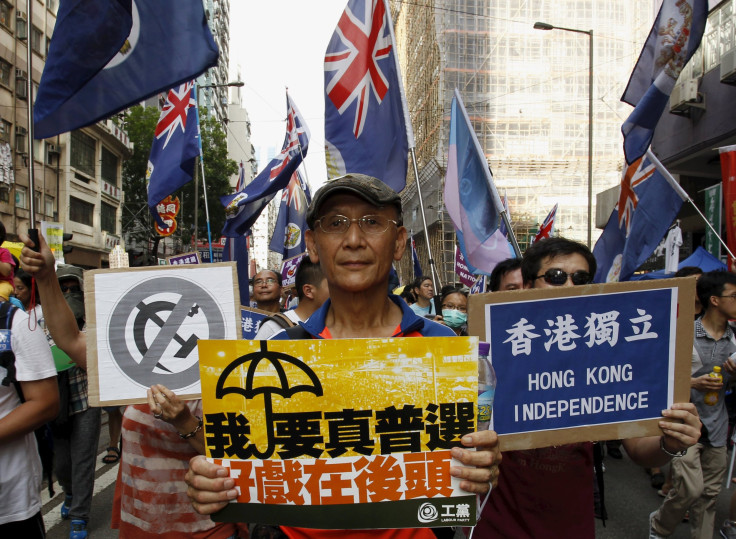Chinese Journalist Jailed For Covering Hong Kong Protests Freed After 9 Months -– But Her Lawyer's Arrested

Zhang Miao, a researcher for German newsmagazine Die Zeit who was detained after helping to report on pro-democracy protests in Hong Kong last year, was released by Beijing police Thursday night after nine months in detention. But human rights groups said her lawyer, Zhou Shifeng, who met her on her release, was later arrested himself, and four staffers of his law firm are also reported to have been detained on Friday, in a sign that China’s crackdown on civil rights activists and lawyers goes on.
Zhang Miao’s detention had aroused concern about the government’s toughening attitude to foreign media based in China. A Chinese national who had lived in Germany for many years, she was detained in Beijing in October, after she accompanied Die Zeit correspondent Angela Köckritz to Hong Kong, to report on protests against China’s plans for the city's political future.
No charges against Zhang were ever formally announced, but Köckritz, who was also questioned repeatedly by Beijing police after Zhang’s detention, said police had accused Zhang of inciting unrest. Zhang, who was not formally registered with the authorities as a member of Die Zeit’s staff – as foreign media assistants in China are supposed to be – was believed to have angered the authorities by posting images of the Hong Kong protests on Chinese social media, and by trying to attend a poetry reading in solidarity with the Hong Kong protesters after her return to Beijing.
Köckritz left China soon afterward, saying she feared for her own safety, and launched a campaign for Zhang’s release. On Thursday she tweeted ecstatically that Zhang had been released.
Zhang Miao is free!!!!!#freemiao
— Angela Köckritz (@AngelaKckritz) July 9, 2015Köckritz had earlier tweeted a poster calling for Zhang's release:
Zhang Miao is still in prison. It s been eight month now, she s been detained 2 of October. freefreefree. #freemiao pic.twitter.com/l2TTPi0Wog
— Angela Köckritz (@AngelaKckritz) June 1, 2015Zhang's lawyer, Zhou, told the New York Times he believed she had been freed because prosecutors did not accept the police’s statement that Zhang had committed a crime. Three artists who were detained last autumn for supporting the protests were also released Thursday, according to the South China Morning Post of Hong Kong.
But Zhou was himself detained Friday morning, in the hotel where he, Zhang and a colleague were staying after her release, activists said. And four other staff of his law firm are also reported to have been detained on Friday, including prominent lawyer Wang Yu. Wang’s husband and 16-year-old son were also reported missing, after heading to Beijing airport to board a flight to Australia, according to the Hong Kong-based China Human Rights Lawyers Concern group.
Wang has worked on a number of high-profile human rights cases in China, including that of five feminist activists held for more than a month after planning public protests against harassment of women. She is currently representing Wu Gan, a civil rights activist who has worked for the same law firm, and who regularly protests outside Chinese courts; Wu was recently detained on charges of "inciting subversion of state power" and “picking quarrels and provoking troubles” – soon after state media accused him of crude and vulgar behavior and of inciting protests. One hundred Chinese lawyers signed a petition raising concern about Wang Yu’s treatment on Friday, calling her a “reasonable, polite and law-abiding lawyer.”
Zhou Shifeng is recently reported to have pledged to set up a fund to defend Chinese human rights lawyers, with more than $1 million in funding. Such activist lawyers have increasingly been targeted by the authorities over the past two years. Prominent Beijing lawyer Xu Zhiyong was jailed last year for four years for “gathering crowds to disrupt public order,” after members of a movement he helped found held “small-scale peaceful demonstrations calling for educational equality and for officials to declare their assets," according to The Guardian. Another outspoken lawyer, Pu Zhiqiang, meanwhile, was recently charged with inciting ethnic hatred and stirring up trouble, and could face eight years in prison. The Chinese Human Rights Lawyers Concern Group recently published a report alleging that detained Chinese lawyers were increasingly facing torture and other forms of abuse.
The government has said repeatedly it is trying to build a law-based society – but some critics have said the authorities seem more interested in rule by law than rule of law. The government has recently passed or drafted a series of new statutes governing terrorism, national security, nongovernmental organizations and the Internet, which critics say will enable it to tighten controls on society. Human Rights Watch researcher Maya Wang told International Business Times this week that these measures are aimed at keeping citizens in “a cage of law.” Amnesty International said recently that China is experiencing one of its "darkest periods for freedom of expression” since the Tiananmen Square crackdown of 1989.
© Copyright IBTimes 2024. All rights reserved.












